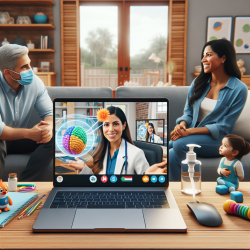As practitioners dedicated to providing the best possible outcomes for children, it's crucial to stay informed about the latest research and incorporate data-driven strategies into our practices. The research article titled
B - Scientific Sessions provides valuable insights that can significantly enhance online therapy services. In this blog, we'll explore the key findings of this research and discuss practical ways to implement these outcomes in your practice.
Key Findings from B - Scientific Sessions
The research presented in
B - Scientific Sessions highlights several critical areas that can improve the efficacy of online therapy services:
- Personalized Interventions: Tailoring therapy sessions to meet the individual needs of each child significantly improves engagement and outcomes.
- Use of Technology: Leveraging advanced technological tools can enhance the delivery of therapy and make sessions more interactive and effective.
- Data Monitoring: Regularly tracking and analyzing data helps in identifying patterns and making informed decisions to adjust therapy plans.
- Family Involvement: Encouraging family participation in therapy sessions fosters a supportive environment that can accelerate progress.
Implementing These Findings in Your Practice
To maximize the benefits of the insights from
B - Scientific Sessions, consider the following strategies:
1. Personalize Interventions
Tailoring therapy sessions to the unique needs of each child is paramount. Utilize assessment tools to identify specific areas where a child needs support and customize your interventions accordingly. This personalized approach not only boosts engagement but also leads to more significant improvements.
2. Leverage Technology
Incorporate advanced technological tools into your online therapy sessions. Tools such as interactive games, virtual whiteboards, and speech recognition software can make sessions more engaging and effective. Technology can also facilitate remote assessments and provide real-time feedback, enhancing the overall therapy experience.
3. Monitor Data Regularly
Implement a robust data monitoring system to track the progress of each child. Regularly analyze this data to identify trends and adjust therapy plans as needed. Data-driven decisions ensure that your interventions are effective and that you can quickly address any areas of concern.
4. Encourage Family Involvement
Involve family members in the therapy process. Provide them with strategies and activities they can do at home to support their child's progress. Family involvement creates a supportive environment that reinforces the skills being developed during therapy sessions.
Encouraging Further Research
While the insights from
B - Scientific Sessions are invaluable, continuous learning and research are essential for staying at the forefront of the field. Here are some ways to encourage further research:
- Stay Updated: Regularly read research articles and attend conferences to stay informed about the latest developments in online therapy and speech-language pathology.
- Collaborate with Peers: Engage with other practitioners to share insights and discuss new research findings. Collaborative efforts can lead to innovative solutions and improved practices.
- Conduct Your Own Research: Consider conducting your own research to explore new methodologies and interventions. Sharing your findings with the community can contribute to the collective knowledge and enhance overall practice.
Conclusion
Implementing the findings from
B - Scientific Sessions can significantly enhance the effectiveness of online therapy services. By personalizing interventions, leveraging technology, monitoring data, and involving families, practitioners can create better outcomes for children. Additionally, continuous learning and research are crucial for ongoing improvement and innovation in the field.To read the original research paper, please follow this link:
B - Scientific Sessions.










